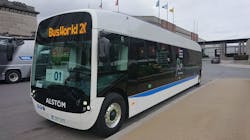Alstom to present first Aptis serial vehicle at Busworld
Alstom is presenting the first serial vehicle of its Aptis electric bus at Busworld, following four prototypes that have been on the roads in French and other European cities for the past two years.
The new design incorporates feedback from passengers and transport operators and this first serial vehicle is based on an optimized global architecture, requiring fewer spare parts references and considerably facilitating maintenance operations. Its ease of insertion increases with a wheel steering angle of 40 degrees. The 15 percent reduction in the total weight of the vehicle, combined with the use of new, more efficient batteries, increases range. Alstom says the Aptis now accommodates more passengers while still offering them more fluidity thanks to large sliding doors.
In addition to the technical improvements, Aptis also has improvements to passenger comfort. A new air-conditioning system (fully electrical heat-pump) helps maximize thermal comfort and the panoramic rear lounge has been enhanced to give a feeling of increased space, according to the company. The new hydraulic suspension allows for comfort and sound insulation.
“Alstom and its teams are very proud to be presenting the first series version of Aptis,” said Benjamin Bailly, head of Alstom’s electric bus platform. “This concentration of innovations perfectly represents what we always envisaged the production version of the 100 percent electric mobility solution would be. This clean, green bus, with its elegant design and optimized technical performance, will offer a new experience to passengers and drivers while meeting the new mobility challenges of urban areas."
Alstom says Aptis has already been chosen by Paris, France, in the context of Europe’s largest call for tender for electric buses, as well as by the cities of Strasbourg, Grenoble, La Rochelle and Toulon. Alstom is working on ongoing tests in Spain with the ground-based recharge solution SRS and the training of hundreds of drivers in a new driving experience ahead of the first traffic releases, scheduled for the end of the year in Strasbourg.
Manufacturing and testing of Aptis will be carried out at Alstom's two sites in Alsace. The Hangenbieten site oversees manufacturing of the end modules (driver's cab and rear lounge). Manufacturing of the central passenger module, final assembly and tests will be carried out at the Reichshoffen site. This scheme will allow serial production from the end of 2019 onwards. Five other Alstom sites in France contribute to the design and manufacture of Aptis: Saint-Ouen for system integration, Tarbes for traction, Ornans for engines and Villeurbanne for electronic components of the traction chain.
In order to complete Alstom’s vison of road electromobility, exhibited alongside Aptis at Busworld will also be SRS, a ground-level, conductive, static recharge system allowing the charging of buses along their route or within depots. As a ground-based solution, it eliminates the need for overhead infrastructure in cities. In depots, SRS avoids the infrastructure costs associated with overhead charging systems. SRS for e-buses is based on Alstom’s SRS static recharge technology for trams, a solution already in operation in Nice, France. It is developed at Alstom’s Vitrolles site.
